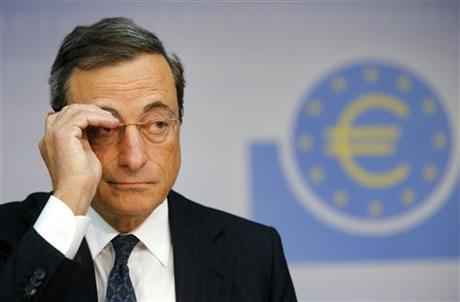
By JUERGEN BAETZ
President of European Central Bank Mario Draghi adjusts his glasses during a news conference in Frankfurt, Germany, Thursday, Sept. 5, 2013, following a meeting of the ECB governing council.The European Central Bank left interest rates unchanged, with President Mario Draghi saying the slow pace of the euro area’s recovery meant the bank’s stance won’t change for some time. Draghi spoke after the ECB governing council left its key benchmark unchanged Thursday at a record low of 0.5 percent. (AP Photo/Michael Probst)
BRUSSELS (AP) — European lawmakers approved legislation Thursday that will centralize oversight of Europe’s largest banks, a key step in their plan for stabilizing the bloc’s financial system.
The centralized bank supervision, which will be anchored by the European Central Bank, will be up and running next year following a thorough stress test of banks’ balance sheets.
The so-called single supervisory mechanism is the first of three pillars of the bloc’s planned banking union, the cornerstone of efforts to turn the tide on the 17-nation eurozone’s three-year-old debt crisis.
Its goal is to make the supervision and rescue of banks the job of European institutions rather than leaving weaker member states to fend for themselves. Failing banks in the past have dragged down government finances and forced European Union countries such as Ireland or Cyprus into seeking bailouts.
The banking supervisor authority will directly oversee 150 of Europe’s largest banks, including about 80 percent of all bank assets in the 17-country eurozone. Members of the wider 28-country EU that do not use the euro currency, like Britain or Poland, can opt to join later.
“Today marks a real step forward in setting up a banking union,” said ECB President Mario Draghi. He added that the new supervisor would “contribute to the restoration of confidence in the banking sector.”
Partially because of Germany and other creditor countries’ reluctance to move too quickly, the establishment of the banking union’s remaining pillars — setting up a joint deposit guarantee and an authority to restructure or wind down banks complete with a common financial backstop — is still a long way from being agreed upon.
German Chancellor Angela Merkel agreed Thursday that the new supervisor was an important step, but cautioned that more work remains to restore investor confidence in European banks.
“I also say that the path must be continued that brings together solidarity in the eurozone with (countries’) own responsibility — they must be two sides of the same coin,” she said in Frankfurt, just ahead of the vote in Brussels. “Simply mutualizing (debt) won’t take us where we need to go — the necessary reforms must really be carried out.”
Many analysts warn that reluctance to agree on a joint backstop could jeopardize the banking union project as a whole.
“There is a strong probability that the institutional arrangements will fall well short of the consistent, effective framework required to attain the objectives of banking union,” Deutsche Bank analysts said in a research note last week.
In another sign of how difficult it has been for European leaders to agree on measures to pull the region out of crisis, a top lawyer for the European Court of Justice said Thursday that an EU-wide ban on short-selling was overreaching. Many blamed the practice, in which investors bet that the price of a stock or bond will go down, for creating tremendous volatility in markets and threatening the stability of the financial system.
The court still has to issue a decision in the case, which was brought by Britain, but it is an example of how competing concerns among countries have hampered progress toward unified European regulation.
The vote on the single supervisor legislation was initially scheduled for Tuesday, but lawmakers called it off as they urged the ECB to agree to greater disclosure of the new oversight authority’s decisions. While the ECB resisted demands to release minutes of the authority’s meetings, it accepted to disclose comprehensive summaries to lawmakers to avoid delaying the crucial legislation by at least another month.
Lawmakers appeared content with the solution, saying it guarantees necessary democratic oversight without jeopardizing financial stability.
In the end, lawmakers overwhelmingly approved the ECB as the supervisor, with 559 voting for, 62 against and 18 abstaining.
Once the legislation enters into force, the ECB plans to unveil its roadmap for the next steps by mid-October.
The Frankfurt-based central bank will then announce details of how it will assess the balance sheets of the banks the new body will be overseeing.
___
Associated Press writers Lori Hinnant and Sarah DiLorenzo contributed from Paris.
___



